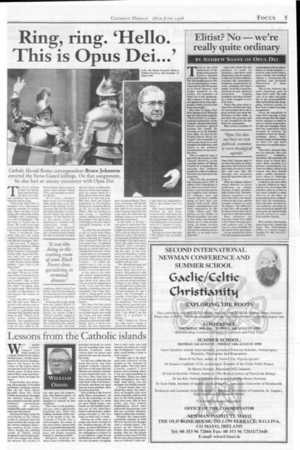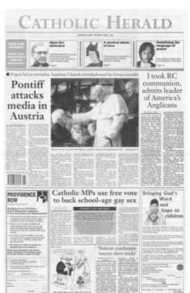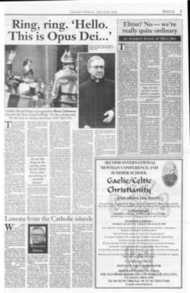Page 5, 26th June 1998
Page 5

Report an error
Noticed an error on this page?If you've noticed an error in this article please click here to report it.
Tags
Share
Related articles
Britain's Opus Dei Head Dies In Hiking Accident
The Slashing And Burning Of Opus Dei
Protest Against Escriva
By Tracy-jo Smith
Pope Says Opus Dei Leads The Way
Elitist? No we're really quite ordinary
BY ANDREW SOANE OF OPUS DEI
T...y is the 23rd anniversary of the death ofJosernaria Escriva, Spanish priest and founder of Opus Dei. His beatification in 1992 was an extraordinary event, witnessed by 300,000 people in St Peter' Square, and widely reported in the media. For members of Opus Dei it was unmistakable evidence of the cockslid significance of the spirituality Father Escriva had lived and taught.
But what is Opus Dei? Who belongs to it? What do they do? Opus Dei (Latin for "Work of God") is an international institution of the Catholic Church with about 80,000 members spread around the world. Its message is as its founder once said, "as new as the Gospel and as old as the Gospel" and essentially is a call to each one of us to seek complete identification with Christ in the ordinary circumstances of our everyday lives.
This, it might be said, is precisely the purpose of the Church. However, as the conciliar fathers of Vatican Council il recognised, the message that ordinary people are called to holiness has been obscured down the centuries.
Opus Dei has promoted this message since 1928. It affirms that Catholicism is not about two-tiered Christianity -one level for priests and religious and another for ordinary men and women who must muddle along as best they can despite their work, their family commitments and their immersion in the world. Christ said "Be perfect as my Father in Heaven is perfect" not only to the Pope and Mather Teresa hut to each human being. As Father Escriva said, "either we learn to find our Lord in ordinary, everyday life, or we shall never find him". Opus Dei exists for this purpose: to assist its members, and those with whom they come in contact, to find our Lord in ordinary, everyday life: answering a telephone, preparing for an exam, changing the baby's nappy. To do this it provides theological and spiritual formation, helping members and their Mends in a daily struggle to love God more.
Those who come close to Opus Dei will find that they are encouraged above all to pray, to know and study the doctrines of their faith, to put them into practice and to get strength for all this from the sacraments.
Who can be a member of
Opus Dei? Anyone aged 18 or over who wants to struggle to love Our Lord (or even just wants to want to struggle) and sees that the message and assistance given by Opus Dei is the way to do so.
They are ordinary citizens whose lifestyle or status undergoes no change because of their membership of Opus Dei. The hairdresser continues to do cut'n' blow-drys, the farmer to harvest his crops and the accounts assistant to input the figures. The difference is that they will struggle to do this as well as they can as a service to GO and society.
Most members are married. Some feel called to love Christ through apostolic celibacy and, in this way, be more available for the needs of the apostolate.
As an institution Opus Dei will sometimes promote undertakings with an educational or social purpose — schools and universities, farm schools and medical clinics — overseeing the spiritual and doctrinal dimensions of these ventures.
This is not, however, the most important part of Opus Del's work. The vital core of its aims and goals lies in the unquantifiable effect o180,000 people struggling, however poorly, to love God in their everyday occupations.
Given the simplicity of Opus Dei's message, it may seem strange that the organisation appears at times to rouse so much controvers-y. To take one example, Opus Dei has sometimes been accused of secrecy. Its members wear no distinguishing dress, don't mention their membership on their CV and don't announce it at parish meetings.
They don't, because they are not special; they are ordinary Catholics. Members will naturally tell those close to them but, since their vocation is a private commitment (no vows are taken), there is no reason why they should make a public announcement about it (although they're quite free to do so).
Confusion can arise when a specific political or theological view of an Opus Dei member (who is as free as any other Catholic to think what he or she likes on temporal matters) is identified with the institution. Opus Dei does not have its own political, economic or even theological agenda. Its only goals are spiritual and its only desire is to serve God and the Church.
• For further information about Opus Dei, contact the Opus Dei Information Office at 5 Orme Court, London W2 4RL, tel: 0171221 9176.
blog comments powered by Disqus











